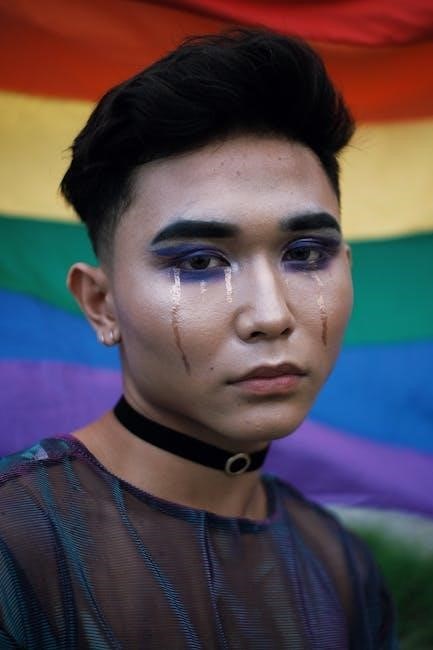Roxane Gay’s Hunger: A Memoir of My Body is a deeply personal exploration of her journey with weight, trauma, and self-acceptance, resonating with readers globally.
1.1 Overview of the Book
Hunger: A Memoir of My Body by Roxane Gay is a raw, unflinching account of her life, focusing on her relationship with her body, weight, and identity. The book delves into her experiences with trauma, societal expectations, and the struggle for self-acceptance. Gay shares her journey from childhood to adulthood, exploring how her body has shaped her sense of self. With vulnerability and candor, she addresses themes of food, consumption, and the cultural norms that dictate how women should look and feel. At its core, Hunger is a powerful exploration of what it means to occupy a body in a world that often seeks to control or judge it. Gay’s memoir is both deeply personal and universally relatable.
1.2 Importance of the Topic
Roxane Gay’s Hunger: A Memoir of My Body tackles critical issues like body image, trauma, and identity, making it a vital contribution to contemporary discussions on self-acceptance and societal expectations. By sharing her personal struggles, Gay sheds light on the often-silenced experiences of individuals, particularly women, who face judgment and marginalization because of their bodies. The book’s exploration of food, weight, and identity resonates deeply in a culture obsessed with beauty standards and dieting. Gay’s work challenges readers to confront their own biases and empathize with others’ journeys, fostering a more inclusive understanding of what it means to live in a body. This makes Hunger not just a memoir but a cultural touchstone for body positivity and resilience.

Themes and Motifs in “Hunger”
Hunger explores profound themes of body image, trauma, and identity, weaving personal narrative with universal struggles, offering a raw yet hopeful examination of self-perception and resilience.
2.1 Body Image and Self-Perception
In Hunger, Roxane Gay delves into the complexities of body image, revealing how societal expectations and personal trauma shaped her self-perception. She recounts her struggles with weight, from childhood to adulthood, and how these experiences influenced her mental health. Gay’s narrative sheds light on the internalized shame and self-loathing that often accompany body image issues, particularly for women. Her journey is marked by moments of self-awareness and introspection, as she grapples with the duality of wanting to be seen while also feeling invisible. Through her story, Gay challenges the notion of a “perfect” body, advocating for self-acceptance in a world that frequently marginalizes those who do not conform to traditional beauty standards.
2.2 Trauma and Its Impact on the Body
Roxane Gay’s Hunger vividly illustrates how trauma manifests physically, shaping her body as both a shield and a source of pain. Her experiences of sexual assault and subsequent emotional numbing led to significant weight gain, which she describes as a form of self-protection. The book explores how trauma disrupts the relationship between mind and body, creating a cycle of self-doubt and disconnection. Gay’s narrative reveals the profound ways in which unresolved trauma can alter one’s physical form and perception of self. Her story underscores the interconnectedness of emotional and physical well-being, offering a raw yet powerful examination of how the body bears the scars of trauma long after the initial wound.
In Hunger, Roxane Gay delves into the intricate relationship between her body and her sense of identity, revealing how societal expectations and personal trauma have shaped her struggle for belonging. She discusses the alienation of being a large black woman in a world that marginalizes both her race and size. Gay’s narrative explores the tension between her desire for invisibility and her yearning to be seen and accepted. Her journey is a poignant reflection on how the body can both define and confine one’s identity, while also serving as a testament to the resilience required to reclaim and redefine selfhood in the face of systemic oppression. Gay’s story offers a powerful critique of the societal norms that dictate who belongs and who does not. Roxane Gay’s Hunger masterfully employs a raw, unflinching narrative voice to share her intimate journey, blending vulnerability with strength through lyrical prose that captivates and impacts deeply. Roxane Gay’s writing in Hunger is characterized by its raw honesty and lyrical precision. She employs a narrative voice that is both unflinching and vulnerable, weaving together personal anecdotes with broader cultural critiques. Gay’s prose is concise yet evocative, often using metaphor and introspection to explore her experiences with body image, trauma, and identity. Her ability to balance emotional depth with intellectual clarity makes her memoir both deeply personal and universally relatable. The text is infused with a sense of urgency and authenticity, drawing readers into her world while challenging societal norms and expectations surrounding the body. Food plays a central and complex role in Roxane Gay’s memoir, serving as both a source of comfort and a tool for coping with trauma. Gay describes how she turned to food as a means of survival, using it to fill the emotional void left by her experiences of abuse and societal pressures. Her relationship with food is deeply intertwined with her body image, as she grapples with feelings of shame and control. Throughout the book, food becomes a metaphor for her hunger—not just for nourishment, but for acceptance and visibility. This duality highlights the ways in which food can both heal and harm, reflecting the broader themes of her journey toward self-acceptance. Roxane Gay’s memoir underscores the transformative power of vulnerability, as she openly shares her struggles with body image, trauma, and identity. By confronting her deepest insecurities, Gay challenges societal norms that often silence marginalized voices. Her willingness to be vulnerable creates a space for readers to reflect on their own experiences, fostering empathy and understanding. Through her unflinching honesty, Gay exemplifies how vulnerability can be a source of strength, allowing individuals to reclaim their narratives and seek healing. This theme resonates deeply, encouraging readers to embrace their own vulnerabilities and find liberation in authenticity. Roxane Gay’s Hunger critiques societal expectations of women’s bodies, exploring intersections of race, gender, and body politics, while advocating for self-acceptance in a judgmental world. In Hunger, Roxane Gay examines how societal beauty standards disproportionately impact women, particularly Black women, imposing unrealistic ideals that perpetuate self-doubt and shame. She critiques the cultural obsession with thinness and the moralization of food, highlighting how these expectations are deeply intertwined with race, gender, and class. Gay’s personal journey reflects the broader struggle of women navigating a world that polices their bodies, often leading to disordered relationships with food and self-image. Her memoir challenges these norms, advocating for a redefinition of beauty and acceptance that embraces diversity and rejects harmful stereotypes. Gay’s voice is both a personal testament and a call to action for societal change. Roxane Gay’s Hunger delves into the intersection of race and gender, revealing how Black women’s bodies are uniquely scrutinized and marginalized. She discusses how societal expectations of femininity are often shaped by white norms, leaving Black women’s bodies invisible or hyper-visible. Gay explores the historical and contemporary ways in which race and gender converge to create distinct challenges, from the fetishization of Black bodies to the erasure of their experiences. Her narrative highlights the resilience required to navigate these intersections while advocating for a more inclusive understanding of body politics. Gay’s perspective offers a powerful critique of systemic oppression and a call for recognition and equality. Her work underscores the importance of amplifying marginalized voices in conversations about identity and acceptance. Roxane Gay’s Hunger vividly portrays her journey toward self-acceptance, highlighting the profound challenges posed by societal beauty standards. Gay describes how her weight and body shape have long been subjects of judgment, creating a cycle of self-loathing and isolation; She shares her struggles with dieting, the temporary highs of weight loss, and the inevitable crashes that follow, emphasizing the emotional toll of these experiences. Gay also reflects on the internalized shame and the societal pressure to conform to unrealistic ideals. Through her narrative, she advocates for radical self-acceptance, urging readers to embrace their bodies despite the world’s expectations. Her story is a testament to resilience and the ongoing effort to find peace and self-love in a critical world. Roxane Gay’s Hunger explores how past traumas deeply shaped her relationship with her body, emphasizing resilience as a core theme in her journey toward healing and self-acceptance. In Hunger, Roxane Gay reveals how childhood trauma profoundly influenced her identity, using food as a coping mechanism. This narrative illustrates the long-lasting impact of traumatic experiences on self-perception and bodily autonomy, shaping her understanding of self-worth and acceptance. Gay’s journey underscores the complex interplay between trauma, body image, and identity, highlighting the resilience required to reclaim one’s narrative. Through her story, she emphasizes the enduring effects of trauma and the struggle to reconcile past pain with present selfhood. In Hunger, Roxane Gay navigates the arduous process of healing and recovery, emphasizing the importance of self-acceptance and empowerment. Her journey highlights the transformative power of confronting past traumas and redefining relationships with her body. Gay’s recovery is not linear but a continuous effort to embrace her identity and challenge societal expectations. Through vulnerability and resilience, she illustrates the possibility of growth and self-love, even in the face of profound pain. Gay’s memoir serves as a testament to the human capacity for healing, offering hope and solidarity to those grappling with similar struggles. Roxane Gay’s Hunger chronicles her profound journey toward self-love, a path marked by introspection and resilience. Gay confronts the societal norms and personal traumas that shaped her relationship with her body, ultimately advocating for self-acceptance. Her memoir illustrates the complexity of embracing one’s identity, emphasizing the importance of visibility and recognition. Through her narrative, Gay challenges readers to rethink their perceptions of body image and self-worth, offering a powerful testament to the transformative power of self-love in a world often hostile to diverse bodies. Her journey underscores the idea that self-love is not a destination but a continuous process of growth and empowerment. Roxane Gay’s Hunger delves into the intersection of body and soul, exploring themes of visibility, recognition, and the struggle to find one’s voice in a fragmented world. In Hunger, Roxane Gay examines the profound connection between her physical form and inner self. Her body, often a source of both pain and resilience, becomes a metaphor for her soul’s journey. Gay illustrates how societal expectations and personal trauma have shaped her relationship with her body, creating a disconnect that she seeks to heal. This intersection is central to her narrative, as she navigate the duality of being both visible and invisible, ultimately striving for self-acceptance and unity between her body and spirit. Her story highlights the universal struggle to reconcile the physical and emotional selves in a world that often seeks to fragment them. Roxane Gay’s Hunger is a testament to her journey of reclaiming voice and agency over her body and life. Through raw, unflinching prose, she challenges societal norms that silenced her, particularly as a Black woman in a world that often marginalizes and objectifies bodies like hers. Gay’s memoir is not just a personal narrative but a powerful declaration of self-ownership, where she confronts the systems that sought to erase her. By sharing her story, she asserts her humanity and demands to be seen and heard, offering readers a blueprint for finding their own voice and reclaiming their agency in a world that often seeks to diminish it. Her words become a catalyst for empowerment and liberation. Roxane Gay’s Hunger delves into her struggle for visibility and recognition in a society that often renders her invisible. As a Black woman in a large body, she confronts the dual erasure of race and size, challenging the norms that dehumanize her. Gay’s memoir is a call for acknowledgment, not just of her existence, but of her worth; She critiques the ways in which systems of oppression deny visibility to marginalized bodies, while simultaneously demanding to be seen and heard. Through her unflinching narrative, Gay seeks recognition of her humanity, urging readers to confront the ways in which societal structures perpetuate invisibility and demanding a world where all bodies are seen and valued equally. Her voice becomes a powerful tool for reclaiming space and identity. Hunger received widespread critical acclaim for its raw honesty and profound insight into body image, trauma, and identity. Readers praised its unflinching narrative, resonating deeply with shared struggles, while critics highlighted its cultural significance in sparking conversations about acceptance and empowerment, solidifying its place as a pivotal work in contemporary literature. Roxane Gay’s Hunger: A Memoir of My Body has garnered significant critical acclaim for its unflinching narrative and profound exploration of identity, trauma, and self-acceptance. Critics have praised the book for its raw honesty and emotional depth, with many highlighting its ability to resonate with readers on a deeply personal level. The memoir has been celebrated for its nuanced examination of societal expectations and the struggles of living in a body that does not conform to traditional norms. Reviewers have also commended Gay’s writing style, describing it as powerful, evocative, and deeply moving. The book’s impact extends beyond literature, contributing to broader conversations about body positivity and empowerment. Its reception underscores its importance as a cultural and literary milestone. Roxane Gay’s Hunger: A Memoir of My Body has significantly influenced the body positivity movement by challenging societal beauty standards and advocating for self-acceptance. The book’s raw honesty about living in a marginalized body has resonated deeply, inspiring readers to embrace their own bodies and reject harmful norms. Gay’s narrative has become a powerful tool in fostering inclusivity and empowerment, particularly for individuals who have long felt invisible or misunderstood. By sharing her journey, Gay has helped redefine conversations around body image, encouraging a more compassionate and accepting cultural dialogue. Her work continues to be a beacon of hope and validation for those seeking to reclaim their bodies and identities. Readers of Hunger: A Memoir of My Body have deeply connected with Roxane Gay’s raw and unflinching narrative, finding solace in her shared experiences of trauma, body image, and identity. Many have expressed how the book resonated with their own struggles, fostering a sense of validation and community. The memoir has sparked meaningful conversations, encouraging readers to reflect on their own relationships with their bodies and societal expectations. By sharing her journey, Gay has created a space for open dialogue, helping readers feel less alone in their own battles with self-acceptance. The book’s relatability has made it a cherished resource for those seeking empowerment and understanding. Roxane Gay’s Hunger leaves a lasting impact, reshaping conversations around body image, trauma, and self-acceptance, offering a powerful narrative that resonates deeply and fosters enduring reflection. Roxane Gay’s Hunger: A Memoir of My Body delves into profound themes of body image, trauma, and identity. Gay explores her complex relationship with her body, shaped by societal expectations and personal experiences of shame. The memoir highlights the intersection of trauma and physicality, illustrating how emotional pain manifests in the body. Central to the narrative is the struggle for self-acceptance and the quest to reclaim one’s body in a world that often seeks to control or judge it. Gay’s journey underscores the resilience of the human spirit and the importance of confronting painful truths to achieve healing. Her story resonates universally, offering a raw yet hopeful perspective on the human condition. Roxane Gay’s Hunger: A Memoir of My Body has left an indelible mark on contemporary literature, sparking vital conversations about body image, trauma, and self-acceptance. The book’s unflinching honesty has empowered readers to confront their own struggles, fostering a sense of solidarity and understanding. Its influence extends beyond the page, contributing to the body positivity movement and challenging societal norms surrounding weight and identity. Gay’s work has solidified her as a fearless and essential voice in modern discourse, ensuring that Hunger remains a pivotal text for years to come. Its legacy lies in its ability to inspire healing, self-reflection, and a deeper appreciation for the complexity of the human experience.2.3 Identity and Belonging

Personal Narrative and Memoir Style
3.1 Roxane Gay’s Writing Style
3.2 The Role of Food in Her Journey
3.3 The Power of Vulnerability
Sociocultural Context
4.1 Societal Expectations of Women’s Bodies
4.2 Race and Gender in Body Politics
4.3 The Struggle for Self-Acceptance

Trauma and Resilience
5.1 The Role of Trauma in Shaping Identity
5.2 Healing and Recovery
5.3 The Journey Toward Self-Love

Identity Exploration
6.1 The Intersection of Body and Soul
6.2 Finding Voice and Agency
6.3 The Search for Visibility and Recognition

Reception and Impact
7.1 Critical Acclaim and Reviews
7.2 The Book’s Influence on Body Positivity Movements
7.3 Reader Responses and Shared Experiences
8.1 Summary of Key Themes
8.2 The Lasting Legacy of “Hunger”